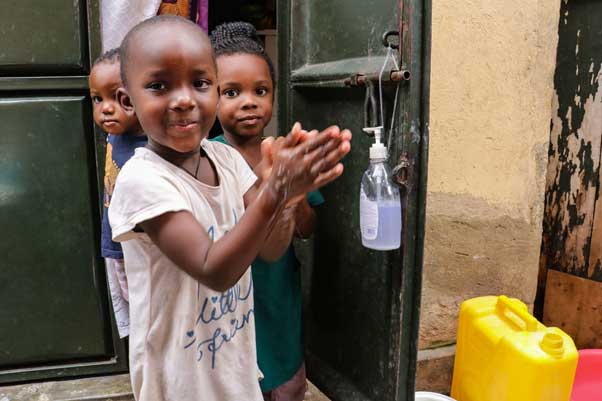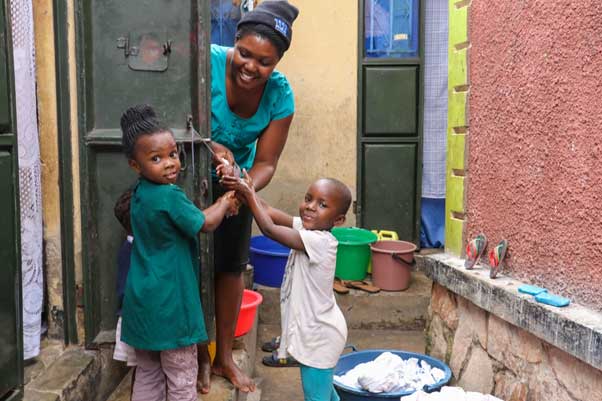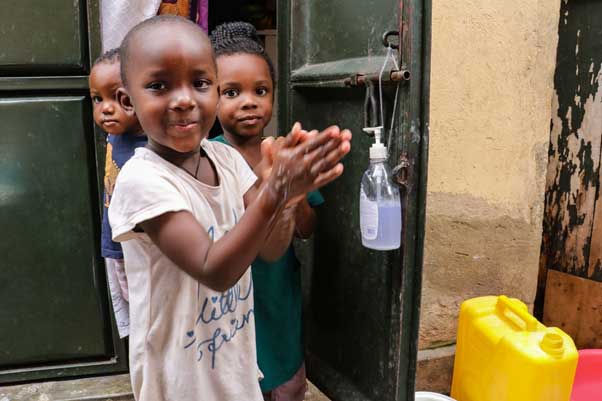For those who live in slums and informal settlements, the Covid-19 pandemic has brought to the forefront their greatest vulnerabilities. But they are fighting back; organising, and coming up with creative ways to protect their communities.
Regular handwashing with soap and water is a first line of defence in protecting from deadly diseases, but in sub-Saharan Africa, 63 per cent of people in urban areas – that’s 258 million people – lack access to decent handwashing facilities.

Globally, there are 3 billion people who do not have access to soap and water to wash their hands at home.
Other preventative measures employed by governments such as lockdowns and curfews are equally implausible for those living in slums and informal settlements.
It’s often so crowded that there is often no space for physical distancing, especially for those who need to leave their homes to collect water or use communal toilets.
When businesses are informal and your economy functions on a day-to-day basis, advice to work from home, or close your business is unworkable. In many places informal markets have been cleared and people evicted in response to COVID-19, ignoring the rights of the urban poor and the role they play in the rest of the city.
Despite all these barriers, those living in informal settlements are organising to fight back against COVID-19.

Some of the most inspiring responses to the pandemic we are seeing have been led by residents of informal settlements. They are installing handwashing stations, producing maps and situation reports, and even highlighting isolation areas.
We must learn from, and scale up, these community-led activities, and empower people to protect themselves.
At WaterAid, supported by partners such as H&M Foundation, we have been working with groups within informal settlement in their work to bring handwashing facilities, clean water and decent toilets to everyone in their community.
In Kamwokya II, in Kampala, Uganda’s capital city, which is home to more than 6,000 people in less than half a square kilometre of land, Christopher Tumwine leads a community action group called ‘Weyonje’ (clean yourself’), supported by WaterAid and the Kampala Capital City Authority.
For Chris, clean water, good hygiene and decent toilets are always front of mind. Weyonje goes house to house talking to people about how to use toilets properly and dispose of the waste safely.
Worried that advice and programmes aimed to protect the population against COVID-19 are leaving informal settlements behind, they are now also teaching people about the importance of hygiene and handwashing.
To create long term change, Chris needs the support of government, business and his neighbours, and in recent years, he has spent his time campaigning for a sustainable solution to protect his community’s health, safety and dignity from overflowing sewers, filthy water and disease.
Chris said: “Our settlement is densely populated, and houses are near each other. Social distancing is a myth in the slums, it is something designed for people living in affluent places of the city. We have shared toilets, bathrooms and public water taps, and our children always get out of the houses to play with other kids in the neighbourhood. We are just lucky that Coronavirus has not reached the slum.”
Chris believes community groups like Weyonje are crucial to stopping the spread of diseases such as COVID-19 in the area:
“In Kamwokya, we have created a Weyonje WhatsApp group during the lockdown where group members share information on how best we can help the community. This is a good platform that we can use to counter misinformation about COVID-19 that is circulating on social media. Using megaphones, we carry out house to house community education; teaching the community residents that proper and regular handwashing with water and soap is a defence against the spread of coronavirus.”
As many in the community don’t have a water source close to home, they create makeshift handwashing stations, filling a plastic bottle with soap and water and tying it to their front door with string, so they can wash their hands before entering their homes.
Across the world there are groups and organisations just like Weyonje, working tirelessly to protect their communities from the spread of illness and convince the public and government alike that clean water and decent toilets must be a priority.
In Kenya, for example, Muungano wa Wanavijiji – which means ‘united slum dwellers’ – are using their knowledge of the country’s informal settlement to help track cases of COVID-19 and communicate government messages about preventing the spread of the disease to those who are the most vulnerable.
In 2019, and before the Covid-19 pandemic started, WaterAid followed Weyonje and its leader Chris to film their work and witness an exciting moment for Kamwokya. Watch the film, supported by H&M Foundation, to see what the team achieved here.
Original Source; IPS

